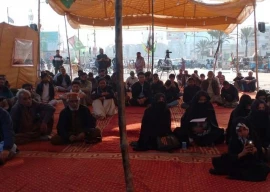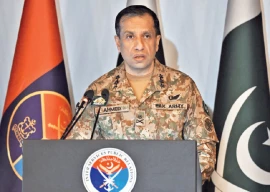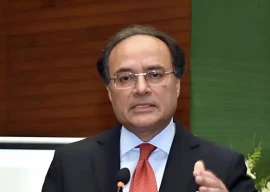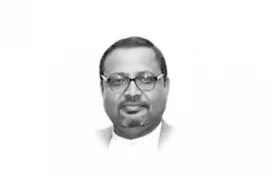
What is the rationale behind these actions? They are carried out by men who claim they intend to enforce Islamic rule in the land. Surely, they cannot believe killing men as they pray is an act that falls in line with their claims of religious devotion; it can also only reduce sympathy for their cause in the eyes of ordinary people. No one condones blasts at mosques. But at the same time, we wonder why we do not hear a more vociferous condemnation from our religious leaders, who have spoken only in murmurs against the terrorist scourge which has ,over the past few years, killed thousands.
The suggestion that the Darra Adam Khel blast may have been the result of a rivalry between local groups needs to be examined. But this cannot explain other attacks that have taken place. We can only assume the bombers who plot and plan these ‘missions’ aim to create fear across society. This is what terrorism is all about. Perhaps their capacity to strike has diminished as a result of the campaign against them and they have honed in on mosques as easier targets, where they are certain to be people present and where a blast will create the kind of panic that is their main purpose.
In all of this, one must not lose sight of the fact – chilling as it may be – that terrorists have a tendency to exploit weaknesses and this is precisely what they have done this time as well. For instance, one reason for the choice of this location for the attack, according to several reports, was that the mosque was close to the house of a local who had in the past stood up to the Taliban. A spokesman for the Tehrik-e-Taliban Pakistan has been quoted as denying the attack and instead blaming Blackwater/Xe which borders on the sublimely ridiculous. Not altogether unsurprisingly, such conspiracy theories are often rattled off by so-called ‘defence analysts’ and ‘experts’ in various sections of the media and it doesn’t take much to figure out just whose language they are speaking.
What we need is concerted action in all areas where the Taliban are operating — and by this one is suggesting North Waziristan, which, more or less, remains a safe haven for certain elements of the Afghan Taliban, and in particular the Haqqani network. The Pakistan government and the military are reluctant to go into the agency because they say that it would open up another front and could have massive repercussions in the rest of the country. However, the latter is already a reality with suicide attacks still happening at a time and location of the terrorists’ choosing. This, of course, notwithstanding tall claims made by all and sundry, that the war against the Taliban is being won — a most subjective and contestable assertion if ever there was one. Those who think that this is not an option for now, one has to say, seem to be wedded to the flawed concept of ‘strategic depth’ whose aim is to install a Pakistan-friendly government in Kabul. The flaw lies in the choice of partners — instead of the obscurantist and militant Taliban, why not choose a set of players who have the same ideals and values as most political parties in Pakistan. Wouldn’t that be the most obvious and natural course to follow?
Published in The Express Tribune, November 7th, 2010.






1735283394-0/sidra--(9)1735283394-0-270x192.webp)



1720030784-0/Smog-free-Lahore-(14)1720030784-0-270x192.webp)
1733421998-0/New-Project-(1)1733421998-0-270x192.webp)






COMMENTS
Comments are moderated and generally will be posted if they are on-topic and not abusive.
For more information, please see our Comments FAQ